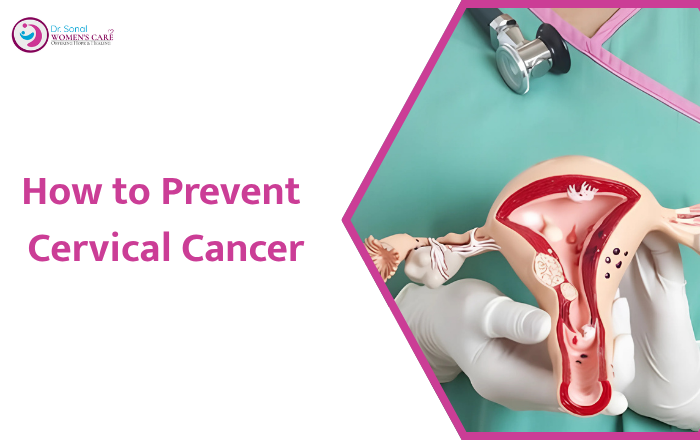Cervical cancer is something many women don’t think about—until it becomes a real concern. The good news? In most cases, cervical cancer can be prevented with the right steps taken early. Whether you’re a young woman or approaching your midlife years, understanding how to protect yourself is a powerful act of self-care.
In this blog, we’ll walk you through practical, easy-to-follow ways to lower your risk of cervical cancer—from vaccines and screenings to healthy habits and lifestyle changes.
Let’s begin by understanding what cervical cancer really is.
What is Cervical Cancer?
Cervical cancer starts in the cells of the cervix—the lower part of the uterus that connects to the vagina. The main cause of cervical cancer is a long-term infection with high-risk types of human papillomavirus (HPV), a common virus passed through sexual contact.
Most HPV infections go away on their own, but in some cases, the virus stays and causes changes in the cervical cells that can lead to cancer over time.
Who is at Risk for Cervical Cancer?
Cervical cancer doesn’t develop overnight, and there are several factors that can raise your risk:
- Having multiple sexual partners
- Starting sexual activity at a young age
- Smoking
- Weak immune system
- Long-term use of birth control pills
- Not getting regular Pap smears or HPV tests
Understanding these risks helps you take control of your health early on.
Top 7 Ways to Prevent Cervical Cancer
1. Get the HPV Vaccine
The HPV vaccine protects against the types of HPV that are most likely to cause cervical cancer. It’s most effective when given before becoming sexually active, but even if you’re older, it may still help.
If you’re a parent, talk to your doctor about vaccinating your daughter (or son) as early as age 9.
2. Go for Regular Pap Smears and HPV Tests
Pap smears check for abnormal changes in the cervix, and HPV tests detect the virus early. These tests help find warning signs before cancer develops.
How often should you go?
- Every 3 years for Pap smears (if results are normal)
- Every 5 years for HPV testing (or combined with Pap)
3. Practice Safe Sex
Using condoms during sex lowers your chances of getting HPV and other infections. Limiting the number of sexual partners can also reduce your risk.
While condoms don’t give 100% protection against HPV, they are still very helpful.
4. Avoid Smoking
Smoking weakens the immune system and makes it harder for your body to fight HPV. It also damages cervical cells, which increases your chances of developing cancer.
If you smoke, consider seeking support to quit. Your cervix—and your whole body—will thank you.
5. Support Your Immune System
Your immune system plays a big role in clearing HPV infections naturally. Here are simple ways to support it:
- Eat more fruits and vegetables
- Get enough sleep
- Reduce stress
- Stay active
- Stay hydrated
6. See Your Gynecologist Regularly
Even if you feel fine, routine visits to a gynecologist can catch problems early. It’s not just about cancer—it’s about keeping your reproductive health in check.
If you live in or near Ambegaon Budruk, we’ve got a trusted recommendation for you at the end of this article.
7. Follow Up on Any Abnormal Results
If your test results are abnormal, don’t panic—but don’t ignore them either. Your doctor may recommend more tests or simple procedures to stop any changes before they turn into cancer.
Catching it early often means a quicker and easier recovery.
Lifestyle and Diet: Small Changes, Big Impact
Your daily choices matter. A healthy lifestyle can help reduce your risk:
- Eat foods rich in vitamin C, folate, and antioxidants (leafy greens, oranges, carrots, etc.)
- Avoid too much processed or sugary food
- Keep your weight in check
- Limit alcohol intake
While no diet can “cure” or completely prevent cancer, these changes support your overall health and immune function.
FAQs About Preventing Cervical Cancer
Q: What is the best age to get the HPV vaccine?
Ideally between ages 9–12, but up to age 26 is recommended. Some adults 27–45 may also benefit.
Q: What is the best age to get the HPV vaccine?
Ideally between ages 9–12, but up to age 26 is recommended. Some adults 27–45 may also benefit.
Q: Is cervical cancer hereditary?
No, but family history can slightly raise your risk. Lifestyle and virus exposure play bigger roles.
Looking for a Gynecologist in Ambegaon Budruk?
If you’re ready to take your next step, you don’t have to look far.
Dr. Sonal Katarmal, a trusted gynecologist in Ambegaon Budruk, welcomes women of all ages for routine checkups, Pap smears, and cervical cancer screening. She practices at Dr. Sonal Women’s Care, a safe space for women to discuss their health openly and confidently.

